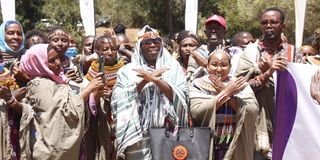Conservancies hailed for helping pastoralist women break barriers

Laikipia North MP Sarah Lekorere (C) leads other woman in marking the International Women's Day at Ngarendare in Meru on March 8, 2022.
Community conservancies in northern Kenya have been lauded for entrenching gender parity and breaking barriers facing women in pastoralist communities.
There are 43 community conservancies spread across Meru, Laikipia, Baringo, Samburu, Marsabit, West Pokot, Isiolo, Garissa, Lamu and Tana River counties supported by the Northern Rangelands Trust (NRT).
Speaking during an International Women’s Day event at the Ngare Ndare conservancy in Meru to celebrate women in conservation, NRT Trading Beadworks Director Beatrice Lempaira said the inclusion of women had significantly improved because of programmes rolled out by the conservancies.
Ms Lempaira noted that when community conservancies started 20 years ago, leadership positions were dominated by men.
“Today, we have tens of female conservancy rangers and women are represented on the council of elders, which is made of conservancy chairpersons,” she said.
“More conservancies are electing women to their management boards as well as employing them as managers. More women are taking part in the conservancy elective process and questioning the governance system,” she said.
She said the NRT, which provides technical support to community conservancies, has gradually engaged communities to embrace women as leaders.
The biases against women, said Laikipia North MP Sarah Korere, was so pronounced in her community that she had to face off with elders to prop up female administrators.
“In one instance, I recommended a lady for appointment as a chief but an administrator and elders ganged up to oppose her. I was summoned by a DC, who argued that a woman was not fit because of cattle rustling. I stood my ground and informed them that it is not the work of a chief to go after stolen cattle. We now have five female chiefs in Laikipia North,” Ms Lekorere said.
Demeaning names
The biases against women, she said, are more pronounced in the political world, especially in pastoralist communities.
“I was called all manner of names when I joined politics. As a woman politician, you are doomed if you are married and doomed if you are not. Either way, they will find demeaning names to discourage you. Women must fight for their space,” she said.
The quest for women's leadership in pastoralist communities has been a torturous journey, said Ms Felista Mayian, from the Naibung’a conservancy in Laikipia North.
“We have a reason to celebrate because women in my community now have a voice. In the past, women from the Samburu, Rendille, Maasai and Pokot (communities) were not allowed anywhere near a meeting where major decisions were made,” she said.
“But today, we can engage men in a meeting and even face them in an election. All this is because of the training we have received from the community conservancy.”
She said it is a great milestone in efforts to eliminate gender bias that women now hold positions such as chairpersons and chiefs.
“The woman’s place is no longer reserved for the kitchen and raising children and goats. We are proudly contributing to the development of our community,” she said.
Traditional culture had sidelined women in the community, said Ms Habiba Tadicha, a former chairperson of the Biliqo Bulesa conservancy board.
“Even when there was a domestic dispute, a woman was not allowed to argue her case. The training we have received from NRT has led to significant gains in access to opportunities for women. We are now educating our girls and seeing more women taking leadership roles,” Ms Tadicha said.
NRT was setting up gender committees in all its five regions to address gender issues, said programmes director Issa Gedi.
Some 70 per cent of women who have gone through NRT’s empowerment programmes, he said, are now in leadership roles in the conservancies and in the communities.
More than 1,000 women have attained financial freedom through the NRT Beadworks initiative, he added.





